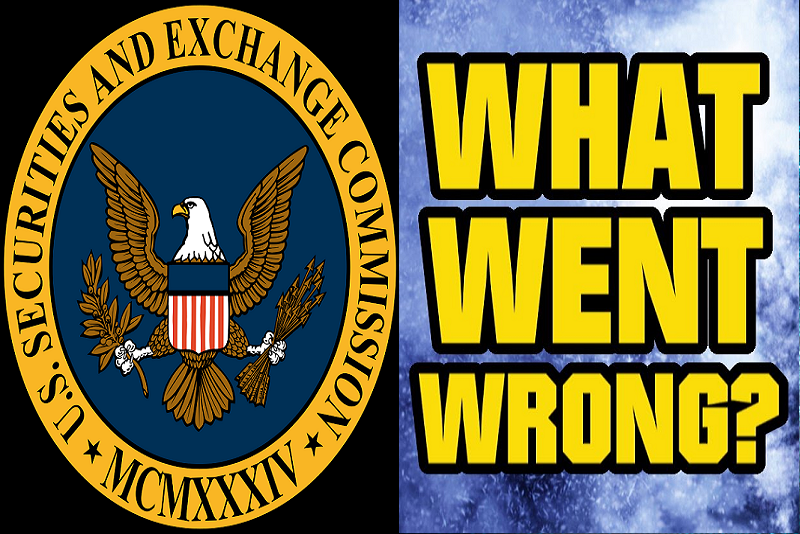BROWSE BY TOPIC
- Bad Brokers
- Compliance Concepts
- Investor Protection
- Investments - Unsuitable
- Investments - Strategies
- Investments - Private
- Features/Scandals
- Companies
- Technology/Internet
- Rules & Regulations
- Crimes
- Investments
- Bad Advisors
- Boiler Rooms
- Hirings/Transitions
- Terminations/Cost Cutting
- Regulators
- Wall Street News
- General News
- Donald Trump & Co.
- Lawsuits/Arbitrations
- Regulatory Sanctions
- Big Banks
- People
TRENDING TAGS
Stories of Interest
- Sarah ten Siethoff is New Associate Director of SEC Investment Management Rulemaking Office
- Catherine Keating Appointed CEO of BNY Mellon Wealth Management
- Credit Suisse to Pay $47Mn to Resolve DOJ Asia Probe
- SEC Chair Clayton Goes 'Hat in Hand' Before Congress on 2019 Budget Request
- SEC's Opening Remarks to the Elder Justice Coordinating Council
- Massachusetts Jury Convicts CA Attorney of Securities Fraud
- Deutsche Bank Says 3 Senior Investment Bankers to Leave Firm
- World’s Biggest Hedge Fund Reportedly ‘Bearish On Financial Assets’
- SEC Fines Constant Contact, Popular Email Marketer, for Overstating Subscriber Numbers
- SocGen Agrees to Pay $1.3 Billion to End Libya, Libor Probes
- Cryptocurrency Exchange Bitfinex Briefly Halts Trading After Cyber Attack
- SEC Names Valerie Szczepanik Senior Advisor for Digital Assets and Innovation
- SEC Modernizes Delivery of Fund Reports, Seeks Public Feedback on Improving Fund Disclosure
- NYSE Says SEC Plan to Limit Exchange Rebates Would Hurt Investors
- Deutsche Bank faces another challenge with Fed stress test
- Former JPMorgan Broker Files racial discrimination suit against company
- $3.3Mn Winning Bid for Lunch with Warren Buffett
- Julie Erhardt is SEC's New Acting Chief Risk Officer
- Chyhe Becker is SEC's New Acting Chief Economist, Acting Director of Economic and Risk Analysis Division
- Getting a Handle on Virtual Currencies - FINRA
ABOUT FINANCIALISH
We seek to provide information, insights and direction that may enable the Financial Community to effectively and efficiently operate in a regulatory risk-free environment by curating content from all over the web.
Stay Informed with the latest fanancialish news.
SUBSCRIBE FOR
NEWSLETTERS & ALERTS
Market Analyst / Adviser Settles SEC Scalping Charges
Mark Gomes, an independent stock analyst and investment adviser, agreed to pay $273,000 in disgorgement, fines and prejudgment interest to settle SEC charges that he engaged in scalping – selling shares of companies that he was 'hawking' or pumping up.
BACKGROUND. Gomes, 46, a resident of Miami Beach, FL, is an unregistered investment adviser and an independent stock analyst. He held a 50% ownership in “Company A,” which he formed in 2013 as a vehicle for distributing his investment recommendations and stock analyses. Company A operated 2 websites: (i) a paid subscription site offering clients benefits such as earlier access to reports and direct contact with Gomes; and, (ii) a free site that essentially was designed to attract potential clients to buy a paid subscription. Company A had no other lines of business, and it had no income other than its paid subscriptions.
Gomes also distributed recommendations and analyses through a 3rd-party website. He actively participated in the comment boards that accompanied those articles, encouraging readers to become paid clients of Company A’s subscription site.
SEC FINDINGS. The Gomes regularly distributed bullish investment recommendations and other analyses and reports about publicly-traded securities. He held shares of the stocks that he wrote about in his recommendations and analyses, so his recommendations and analyses were not disinterested.
- On at least 5 occasions between February 2014 and July 2014, Gomes purchased shares in a stock, recommended buying that stock, and then sold shares in his personal accounts within days of his recommendation. In at least 1 instance, Gomes began selling shares only a few hours after posting his recommendation. Gomes never disclosed that he planned to or was selling his shares.
- In April 2014, Gomes issued a recommendation to clients on Company A’s paid subscriber website that investors purchase shares of an issuer’s stock. That same day and the following day, he sold shares of the stock at a profit. Gomes repeated the process later in the month, recommending the stock on Company A’s free site and on a 3rd-party website and then selling shares 2 days later at a profit.
- By recommending investments, but failing to disclose that he would trade in the opposite direction of his recommendations, Gomes omitted material information necessary in order to make his recommendations not misleading.
A reasonable investor would consider Gomes’s intention to sell his shares as an important factor in assessing the objectivity and credibility of his descriptions. Gomes’s conduct also constituted a device, scheme, or artifice to defraud his clients, and it operated as a fraud or deceit on his clients.
The SEC, therefore, deems this conduct to be fraudulent conduct in the offer or sale of securities and in connection with the purchase or sale of securities - and willful violations of: (i) Section 17(a) of the Securities Act; (ii) Section 10(b) of the Exchange Act; and, (iii) Rule 10b-5 thereunder.
The SEC further deems this conduct to be fraudulent conduct by an investment adviser, and in inviolation of: (i) Sections 206(1) and 206(2) of the Advisers Act.





